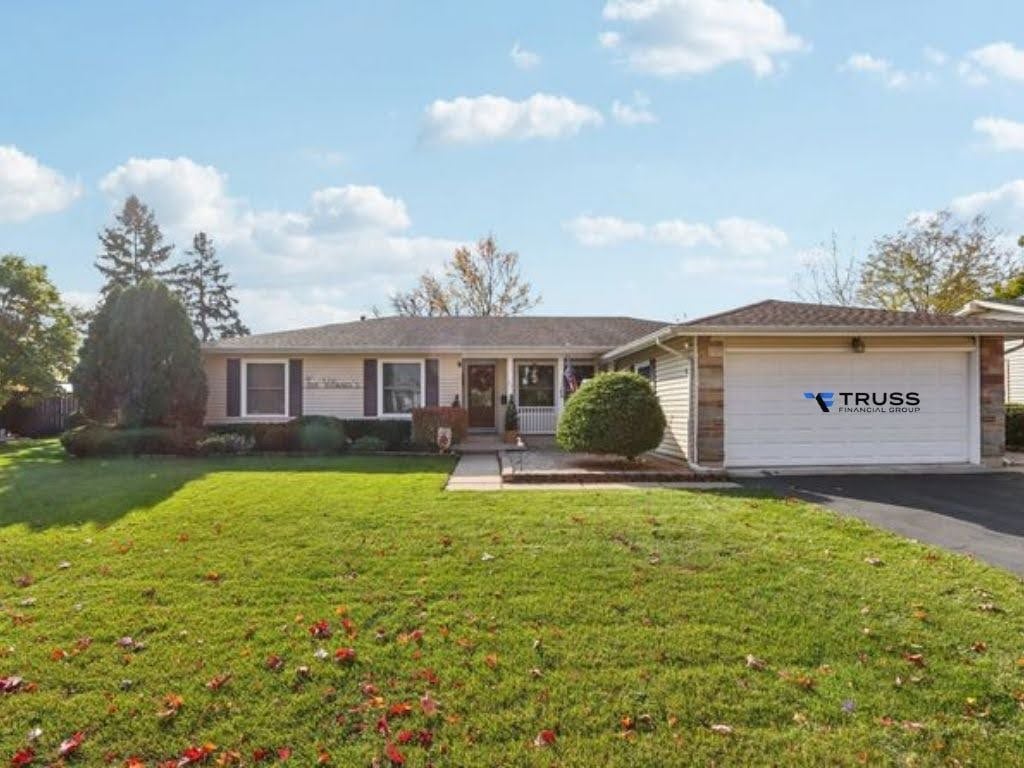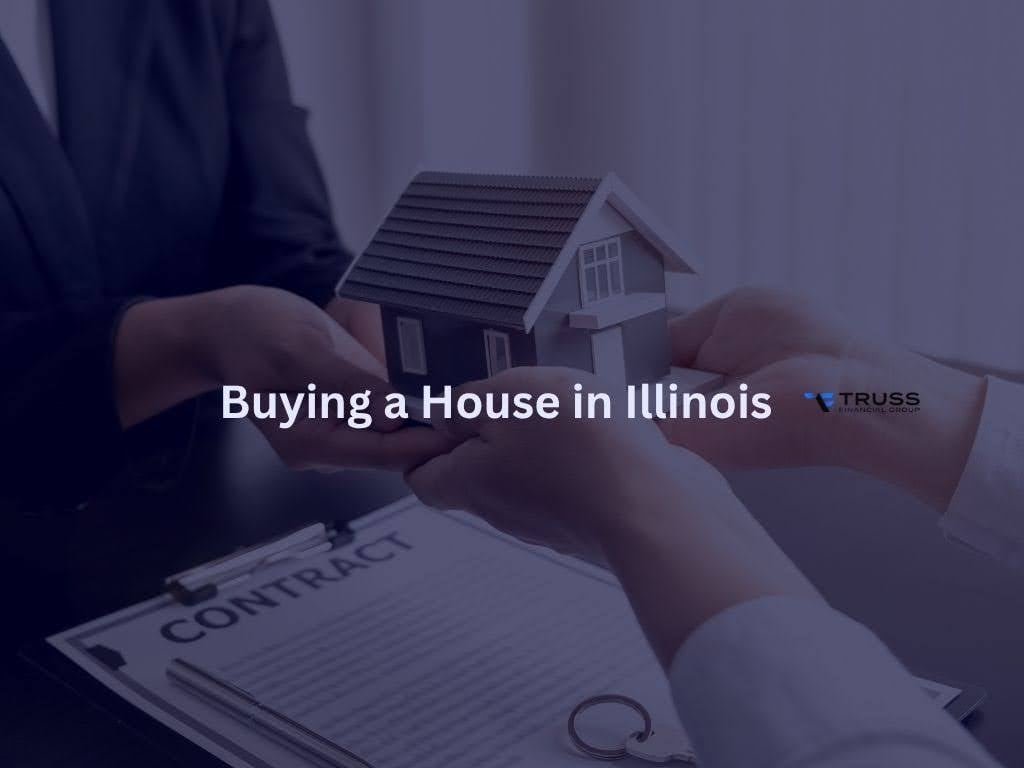Illinois Mortgage and Home Loans
Buying a home in Chicago, Aurora, Naperville, Rockford, Springfield, or anywhere in Illinois? Choose a mortgage lender that helps you select the right home loan, not just the lowest teaser rate. Truss Financial Group serves borrowers statewide with Conventional, FHA, VA, USDA, Jumbo, HELOC, and Non-QM options, including bank-statement loans, DSCR loans, and asset-depletion programs.
If you are a first-time home buyer, we will review Illinois housing assistance through the Illinois Housing Development Authority (IHDA) and local city or county programs so you do not miss available benefits.
This guide explains the mortgage process in plain language, helps you compare mortgage programs, and shows you how to plan your down payment, closing costs, credit score and DTI.
4.6 from 700+ reviews
4.6 from 700+ reviews
4.6 from 700+ reviews
Key Takeaways
- Statewide coverage in Illinois through Truss Financial Group as your mortgage broker.
- Programs offered: Conventional, FHA, VA, USDA, Jumbo, HELOC, Non-QM.
- Non-QM choices include bank-statement, DSCR, and asset-depletion programs.
- TFG specialties: DSCR below 1.0 for investors and a fast Digital HELOC application flow.
- First-time buyers may qualify for IHDA down-payment and closing-cost assistance.
- Typical requirements many lenders look for: credit 580 to 620+, two years of income history, and DTI near or below 45 percent.
- The process follows pre-approval → home search → appraisal → underwriting → closing.
- Rates change daily. Get a personalized quote with a pre-approval.
- Use the Illinois mortgage calculator to plan payment, taxes, insurance, and HOA.
Areas We Serve
We lend across the State of Illinois. Our team regularly helps home buyers and homeowners in Chicago, Aurora, Naperville, Joliet, Rockford, Springfield, Elgin, Peoria, and surrounding counties.
If you live outside these cities, we can still assist you with the same care and speed. Speak with a Truss Financial Group loan advisor for local guidance and a clear next step.

How Do Home Loans Work in Illinois?
The mortgage process in Illinois follows a clear path. You begin with a pre-approval, choose a home, complete the appraisal, move through underwriting, and then attend closing.
Throughout the process we explain your credit score, DTI, down payment, closing costs, and available mortgage programs. First-time buyers may also qualify for IHDA or local down-payment assistance.
Process overview
| Step | Typical Duration | Description |
| Pre-approval | 1–3 days | We review your credit, income, assets, and DTI to set a clear budget and issue a pre-approval letter. |
| Home search | Varies | You work with your agent to select a property and make an offer based on your approved price range. |
| Appraisal | 5–10 days | A licensed appraiser estimates market value to confirm the home supports the loan amount. |
| Underwriting | 1–2 weeks | We verify documents, clear conditions, and confirm program eligibility for your loan type. |
| Closing | 1 day | You sign final documents, pay funds due at closing, and receive the keys once the loan funds. |
What Are the Requirements to Buy a Home in Illinois?
Buying in Illinois is straightforward once you know what lenders review. These are the essentials.
Credit score
- FHA is often available from 580 with 3.5 percent down. Some lenders consider 500–579 with 10 percent down.
- Conventional typically expects 620+ for automated approvals.
- VA and USDA do not set a hard agency minimum score, yet lenders apply their own standards and consider the full file.
Income verification
- W-2 employees: Provide pay stubs, W-2s, and tax returns.
- Self-employed borrowers: May qualify through bank-statement or asset-depletion programs, depending on lender rules.
Debt-to-Income (DTI) ratio
- Most programs aim for 45 percent or lower. Some Conventional approvals reach up to 50 percent with strong compensating factors such as high credit scores, solid reserves, or lower loan-to-value.
Down payment
- Conventional: usually 3 to 5 percent for first-time or well-qualified buyers.
- FHA: 3.5 percent with scores 580 or higher.
- VA and USDA: zero down if you are eligible and the property meets program rules.

What Are the Current Mortgage Rates in Illinois?
Mortgage rates change every day. They move with the bond market and also depend on your profile. Lenders price your rate using your credit score, down payment, DTI, loan amount, loan type, points paid, property type, and the lock period. Illinois rate pages show local snapshots, while national surveys give a weekly benchmark. Use those sources for trend awareness, then get a personalized quote with a pre-approval.
How to read a rate quote
- Rate vs APR: Rate drives principal and interest. APR includes certain costs for apples-to-apples comparisons.
- Points vs credits: Paying points can lower the rate. Taking credits can reduce cash to close.
- Lock period: Longer locks can cost more. Compare 30, 45, and 60 day options.
- Occupancy and property type: Second homes, condos, and investment properties price differently.
What Mortgage Programs Are Available in Illinois?
Use this table to compare common options. Your eligibility will depend on credit, income, property, and county rules.
| Loan Type | Ideal For | Down Payment | Typical Credit | Key Benefit |
| Conventional | Well-qualified borrowers | 3%–20% | 620+ | Broad use and competitive PMI at higher scores. |
| FHA | First-time or credit-rebuilding | 3.5% at ≥580 | 580+ | Flexible credit and DTI guidelines. |
| VA | Eligible service members and veterans | 0% | Lender-set | No monthly PMI and strong terms. |
| USDA | Rural-eligible areas and incomes | 0% | Lender-set | 100% financing if home and income qualify. |
| Jumbo | Homes above FHFA county limits | 10%–20% | 700+ typical | Higher loan amounts for high-cost homes. |
| IHDA DPA | Eligible Illinois buyers | Second-lien assistance per program caps | Program-set | Down-payment and closing-cost help. |
| Bank-Statement (Non-QM) | Self-employed | 10%–20% | Alt-doc | Qualify with deposits rather than tax returns. |
| DSCR (Non-QM) | Investors | 20%+ | Alt-doc | Qualify using property cash flow. |
| HELOC / HELOAN | Owners with equity | Varies | Varies | Tap equity for renovations or consolidation. |
Conventional Loans
Work well for borrowers with solid credit, steady income, and a moderate down payment. County loan limits matter in Illinois. If the price exceeds your local limit, you move into Jumbo territory.
Good fits: Primary homes, second homes, and many investment properties.
FHA Loans
Designed for buyers who are building or rebuilding credit. Minimum 3.5 percent down at 580 or higher. Friendly DTI allowances and flexible credit history rules.
Good fits: Thin credit files, shorter work histories, past credit events that are now seasoned.
VA Loans
For eligible veterans and service members. Zero down financing in many cases and no monthly PMI.
Good fits: Eligible borrowers buying a primary residence and seeking to minimize cash to close.
USDA Loans
Zero down in eligible rural areas, subject to income limits and property maps.
Good fits: Buyers open to USDA-eligible ZIP codes who meet income guidelines.
Jumbo Loans
When the loan amount exceeds your FHFA county limit, you are in Jumbo territory. These loans usually ask for stronger reserves, higher scores, and conservative DTIs.
Good fits: High-value homes, larger acreage, luxury condos with extra review.
IHDA Down-Payment Assistance
The Illinois Housing Development Authority offers down-payment and closing-cost assistance for eligible buyers.
Assistance levels, income limits, and purchase-price caps update periodically. We will confirm the current program fit for your county and profile.
Good fits: First-time buyers and other eligible households who need help with cash to close.
Non-QM and Investor Solutions (TFG Specialties)
Bank-Statement Loans
Qualify using business or personal bank deposits rather than tax returns. Popular with self-employed professionals whose reported net income does not reflect cash flow.
DSCR Loans for Investors
Qualify based on the Debt Service Coverage Ratio of the property, not your personal W-2 income. We underwrite the rent and the projected PITI.
TFG specialty: DSCR below 1.0
If the property is temporarily cash-flow negative, ask about DSCR below 1.0 scenarios. With strong compensating factors such as reserves, equity, or short-term rent trends, we may still structure a deal. Availability varies by investor.
Asset-Depletion Programs
Turn verified assets into qualifying income using program formulas. Useful for retirees or high-asset households.
Interest-Only Options
Lower the required payment for a set period while preserving flexibility, often used by investors planning improvements or a sale.
Home-Equity Options
HELOC and Fixed-Rate HELOAN
Use your home equity for renovations, debt consolidation, or cash management. We will help you weigh variable-rate HELOC versus fixed-rate HELOAN based on your timeline and risk tolerance.
Digital HELOC (TFG Specialty)
Apply online, upload documents, and track progress in a streamlined digital flow. This route is designed to move quickly while maintaining full underwriting integrity.

Buying a House in Illinois
Home prices in Illinois vary by region. The Chicago metro often sits higher, while many smaller cities remain more affordable.
Your total monthly mortgage payment will depend on price, down payment, interest, property taxes, homeowners insurance, and any HOA dues.
Use our Illinois mortgage calculator to see your number before you make an offer.
Tips for shoppers
- Get a pre-approval first so you know your budget by city and county.
- Ask us to compare Conventional vs FHA and see if IHDA assistance can reduce your cash to close.
- Planning a renovation? We can review HELOC and fixed-rate home equity options.
What Mortgage Assistance Programs Are Available in Illinois?
Illinois Housing Development Authority (IHDA)
IHDA offers down-payment and closing-cost assistance that can be paired with certain first mortgages. Programs are typically structured as second liens with published caps and eligibility rules. Income limits and purchase-price caps vary by county and are updated periodically.
Basic eligibility
- Meet program income limits and purchase-price caps
- Minimum credit score set by program and lender
- Complete required homebuyer education
- Occupy the property as your primary residence
How we help
- We verify eligibility, model cash to close with and without assistance, and pair IHDA with FHA or Conventional financing when it makes sense.
- If you do not qualify, we will look at local city and county programs that may layer with your first mortgage.
Other options
- USDA loans for eligible rural areas with zero down and income limits
- Local credit union and city programs that offer grants or forgivable seconds
- Employer assistance where available
What Should I Know About Mortgage-Related Taxes in Illinois?
Plan ahead for closing costs that are specific to Illinois and, in some markets, to the City of Chicago or other municipalities.
- Transfer taxes and recording fees: Illinois imposes transfer taxes and recording charges. Some cities and counties add their own transfer taxes. These amounts vary by location and are paid at closing.
- Property taxes: Property tax rates vary by county and city. Always budget with local assessor figures rather than a statewide estimate.
Want no surprises? Request a county closing-cost estimate that lists transfer taxes, recording fees, title charges, and prepaid items upfront.

Apply for an Illinois Mortgage
Ready to begin with Truss Financial Group? Get a fast pre-approval, compare Conventional, FHA, VA, USDA, Jumbo, HELOC, and Non-QM options, and see whether you qualify for IHDA assistance. We provide a clear budget, a plain explanation of fees and timelines, and a path to closing.
FAQ
What are the current mortgage rates in Illinois?
Rates are set by your profile and the market. For a weekly benchmark, Freddie Mac’s Primary Mortgage Market Survey shows the 30-year fixed averaged 6.22% for the week of Nov 6, 2025. Illinois lenders generally track that national trend, then price up or down based on credit, down payment, points, property type, and lock period. We will quote your exact scenario once you are pre-approved.
What is the 3-7-3 rule for a mortgage?
It is industry shorthand for federal timing rules tied to mortgage disclosures:
- 3 business days to deliver early disclosures after application.
- 7 business days must pass between early disclosures and closing.
- The 3 business-day waiting period is triggered again if the APR changes beyond tolerance and new disclosures are issued.
These requirements originate from the Mortgage Disclosure Improvement Act and are now implemented under TILA and TRID rules.
Will we ever see a 3% mortgage rate again?
No lender can promise that. The last record low for the 30-year fixed was 2.65% in January 2021, during an extraordinary period of monetary policy and bond-market conditions. Today’s market is different.
Future rates will depend on inflation, growth, the Fed’s policy path, and the term premium in Treasuries. Our job at TFG is to structure the best available option for you now and plan a refinance path if rates fall later. We can also model points vs credits, temporary buydowns, or an ARM if that better fits your time horizon and risk.
What salary do you need for a $400,000 mortgage?
Short answer: it depends on your rate, down payment, debts, and county taxes. As a quick yardstick, with 10% down your total housing payment often lands around $2,900–$3,100 per month in many Illinois counties. That typically means about $110k–$120k household income if you keep housing near 31% of gross, or $90k–$100k if total DTI is 45% and other debts are light. TFG can run this with your exact taxes and debts and issue a written pre-approval.
Trusted by 1,964 people
Get a free custom rate quote
- 81% approval rate
- No commitment
👉 Filling out this form won’t affect your credit score.
Get the information you need to make confident decisions
Discover your borrowing power and plan your mortgage journey with knowledge on your side.
Get a quote- No documents required
- No commitment
- No commitment
Get a quote in 3 easy steps
Tell us what you want
Fill out our online form to help us understand your financial situation and loan needs.
We get to work for you
We review your info and look for competitive rates that match your specific goals.
You get a personalized quote
You’ll receive a customized rate quote that meets your unique profile.